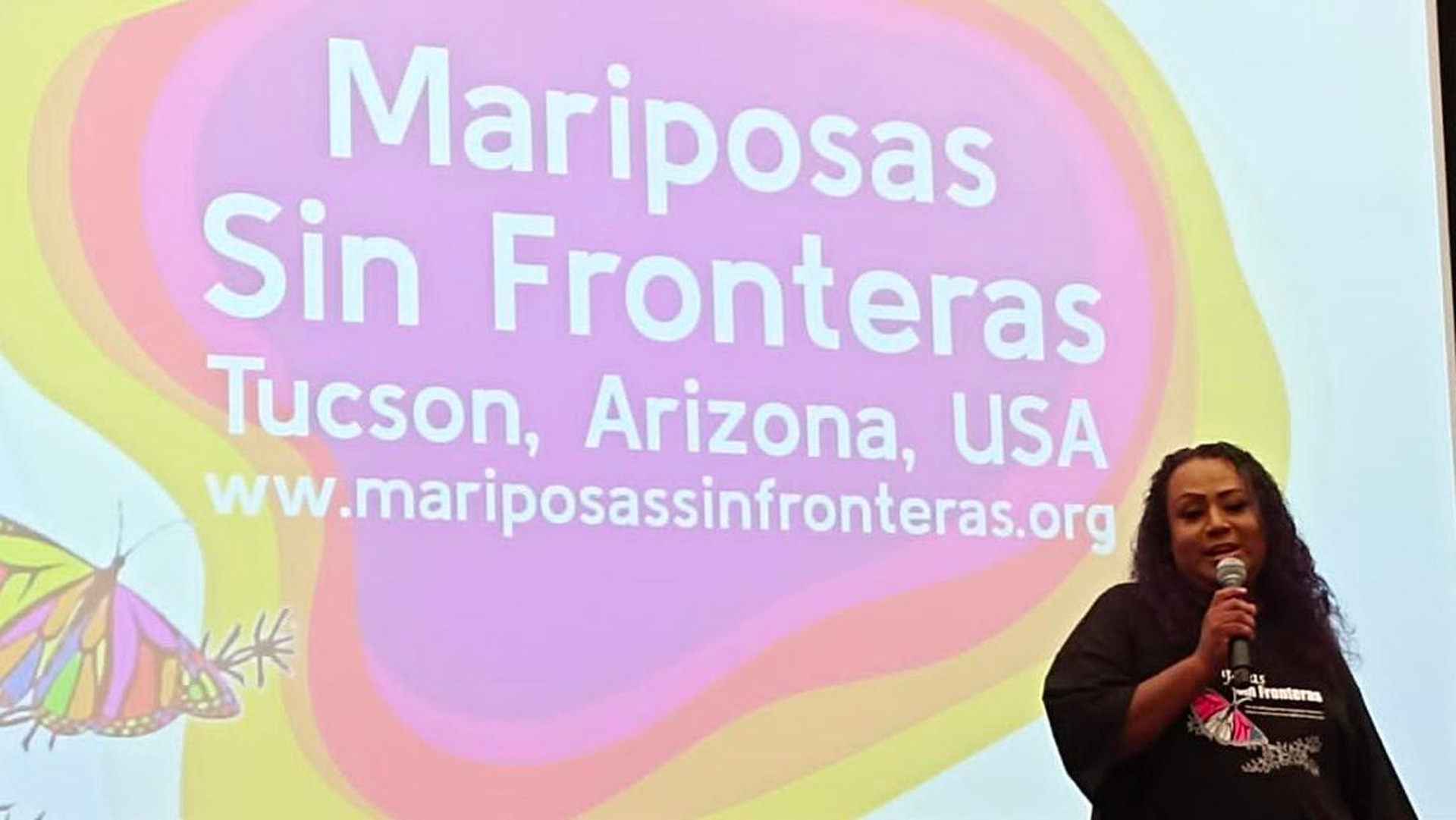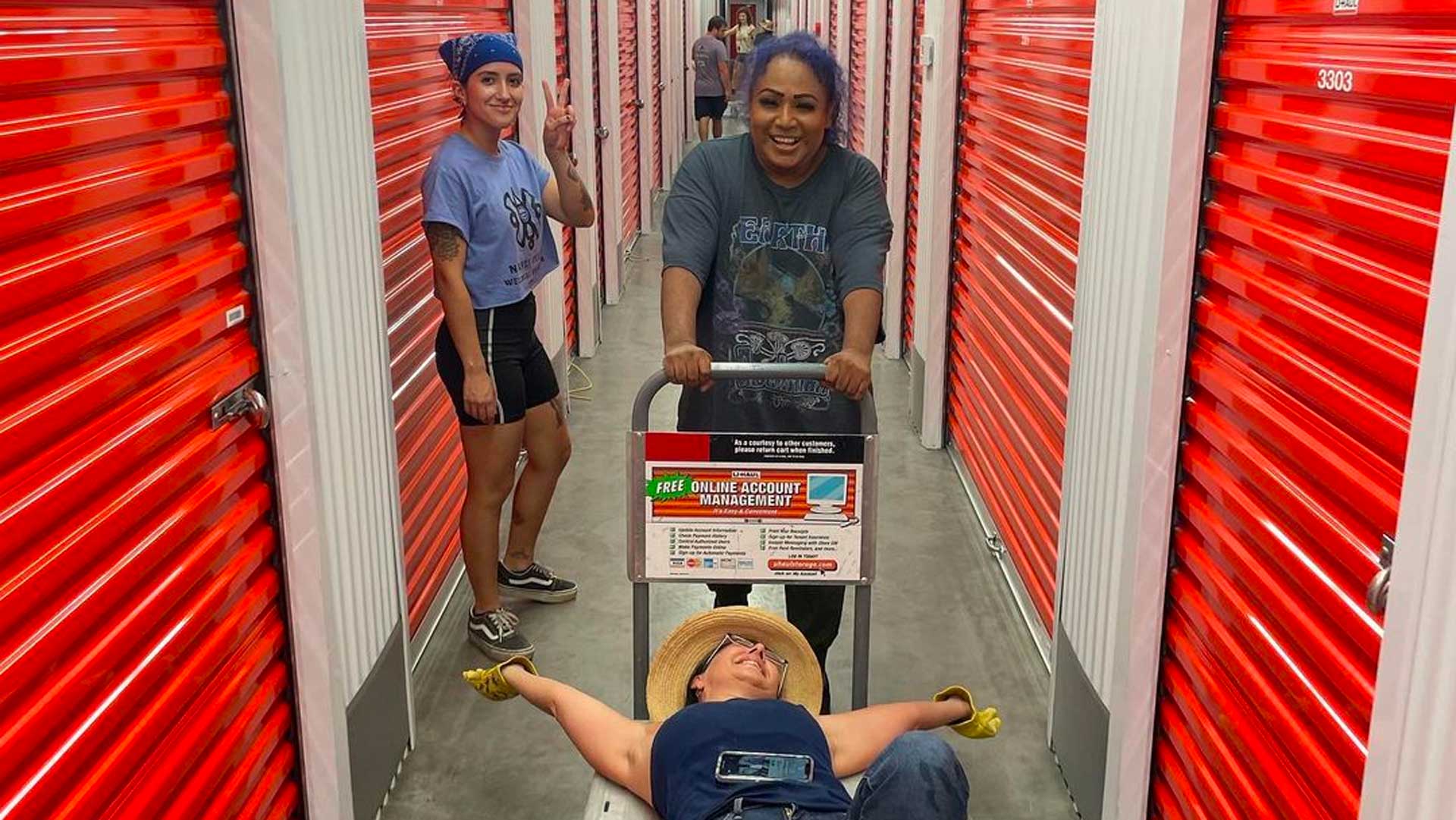 Karolina Lopez Barrera, Mariposas sin Fronteras executive director, speaks at an international conference in Germany last year.
Karolina Lopez Barrera, Mariposas sin Fronteras executive director, speaks at an international conference in Germany last year.
When Karolina Lopez Barrera entered the country undocumented, officials kept her in immigration detention for three years.
“I spent three years in detention. I had three years with men where I suffered being raped, beatings and psychological abuse,” she said in Spanish. “I came out with depression, a stress that even though I’ve been out for more than 10 years, I continue to suffer from.”
Ari Sawyer, a border researcher with Human Rights Watch, says while all migrants are vulnerable, migrants who are LGBTQ are particularly vulnerable and often targeted for abuse, both in Mexico and in detention in the U.S.
“So that’s one of the major issues — whether that person is gay, a lesbian, they are conspicuously queer, then they are routinely targeted for abuse that goes above and beyond the already egregious abuses that migrants face,” they said.
New asylum rules have more migrants waiting in Mexico for an opportunity to seek asylum, rather than in the U.S. Sawyer has documented dozens of instances where Mexican security forces committed abuses against LGBTQ people, including high levels of sexual assault.
“It’s just constant anxiety, all of which combined means that LGBTQ migrants are at particular risk of PTSD, depression, anxiety and a host of other very serious mental health concerns as a result of these abuses,” they said.
Sawyer says a lot of trans migrants are fleeing their home countries because of discrimination but also because they often lack access to gender affirming care.
Lopez won her political asylum case and got out of detention in 2012. The next year she founded Mariposas Sin Fronteras, a nonprofit that helps LGBTQ migrants, especially transwomen, who are in detention, have just been released or are in immigration proceedings.
“When I was inside, I needed someone to visit me,” she says. “Nobody came to visit me. So, I wanted a visit, someone to send me a letter. I did not receive any letters except from the government, which denied my case ... No one was waiting for me outside.”
One of the things Mariposa Sin Fronteras does is “cartas y visitas,” sending cards to and visiting LGBTQ migrants in detention in Arizona.
In 2016, Lopez opened Casa Mariposa, where migrants can live for 6 months to a year free of charge. Casa Mariposa can also connect them with clinics for health services, mental health services, English classes, food and basic necessities.
Casa Mariposa has been slowly working on upgrades for the house, with lots of help from the community. Anyone who wants to get involved, can follow them on Instagram and see what they’re doing.

 Volunteers from programs and organizations like The Community Food Bank, Native Seed Search, and Sowing Remedies Youth Program volunteered at Casa Mariposa's Garden Day, shaping garden areas, installing a French drain, leveling the ground and structuring the yard to take advantage of the rain in August 2022.
Volunteers from programs and organizations like The Community Food Bank, Native Seed Search, and Sowing Remedies Youth Program volunteered at Casa Mariposa's Garden Day, shaping garden areas, installing a French drain, leveling the ground and structuring the yard to take advantage of the rain in August 2022.
Two years ago, Lopez got her US citizenship, but she says being a transwoman, the discrimination continues.
Lopez says the trans community has the same needs they’ve always had, including access to medical care, access to work and a living that’s not discriminatory and laws that protect them.
“We want to create a safe place for the transgender community,” she said. “This house will be an example to other places that could be a safe space for the community, that people can come here and feel safe.”

En español
Mariposas Sin Fronteras ofrece seguridad y apoyo a migrantes LGBTQ
Cuando Karolina López Barrera ingresó al país sin documentos, las autoridades la mantuvieron detenida en un centro de detención de inmigración durante tres años.
“Yo estuve tres años en una detención,” dijo. “Tuve tres años con hombres donde sufrí muchas violaciones, golpes, maltratos psicológicos, y salí con una depresión, un estrés que ya tiene más de 10 años que estoy afuera y sigo sufriendo de eso.”
Ari Sawyer, un investigador fronterizo de Human Rights Watch, dice que aunque todos los migrantes son vulnerables, aquellos que son LGBTQ son aún más vulnerables y a menudo son objeto de abusos, tanto en México como en los centros de detención en Estados Unidos.
Nuevas reglas de asilo han forzado a más migrantes a esperar en México una oportunidad para solicitar asilo en los Estados Unidos. Sawyer ha documentado docenas de casos en los que las fuerzas de seguridad mexicanas cometieron abusos contra personas LGBT, incluyendo altos niveles de agresiones sexuales.
Sawyer dice que es una ansiedad constante. Todo esto combinado hace que los migrantes LGBTQ están en más riesgo de sufrir trastorno de estrés postraumático, depresión, ansiedad y otras preocupaciones graves de salud mental a causa de estos abusos.
Sawyer dice que muchos migrantes trans huyen de sus países de origen debido a la discriminación, pero también porque a menudo carecen atención médica que afirme su identidad de género.
López ganó su caso de asilo político y salió de la detención en 2012. Al año siguiente, fundó Mariposas Sin Fronteras, una organización que ayuda a migrantes LGBT, especialmente a mujeres trans, que están detenidas, acaban de ser liberadas o se encuentran en procesos de inmigración.
“Cuando yo estaba adentro, yo necesite que alguien me fuera a visitar,” dijo. “Nadie fue a visitarme. Entonces, yo quería como una visita, que alguien me mandara una carta. No recibí cartas más del gobierno, que me negaba mi caso o cualquier cosa, pero del gobierno. Nadie me estaba esperando afuera.”
Una de las cosas que hace Mariposas Sin Fronteras es "cartas y visitas", en donde envían tarjetas y visitan a los migrantes LGBT que están detenidos en Arizona.
En 2016, López abrió Casa Mariposa, donde los migrantes pueden vivir de forma gratuita de seis meses a un año. Casa Mariposa también puede conectarlos con clínicas para servicios de salud, servicios de salud mental, clases de inglés, alimentos y necesidades básicas.
Con la ayuda de la comunidad, Casa Mariposa ha estado trabajando lentamente en mejorar la casa.. Cualquier persona que quiera participar puede seguirlos en Instagram y ver lo que están haciendo.
Hace dos años, López obtuvo su ciudadanía estadounidense, pero afirma que, como mujer trans, la discriminación continúa.
López dice que la comunidad trans tiene las mismas necesidades que siempre han tenido, que incluye acceso a atención médica, acceso al trabajo libre de discriminación, y leyes que los protejan.
“Queremos crear un lugar seguro por la comunidad transgenero,” dijo. “Esta casa será un ejemplo a otras casas que sea como algo seguro para la comunidad. Que la gente venga y siente segura aquí.”

By submitting your comments, you hereby give AZPM the right to post your comments and potentially use them in any other form of media operated by this institution.